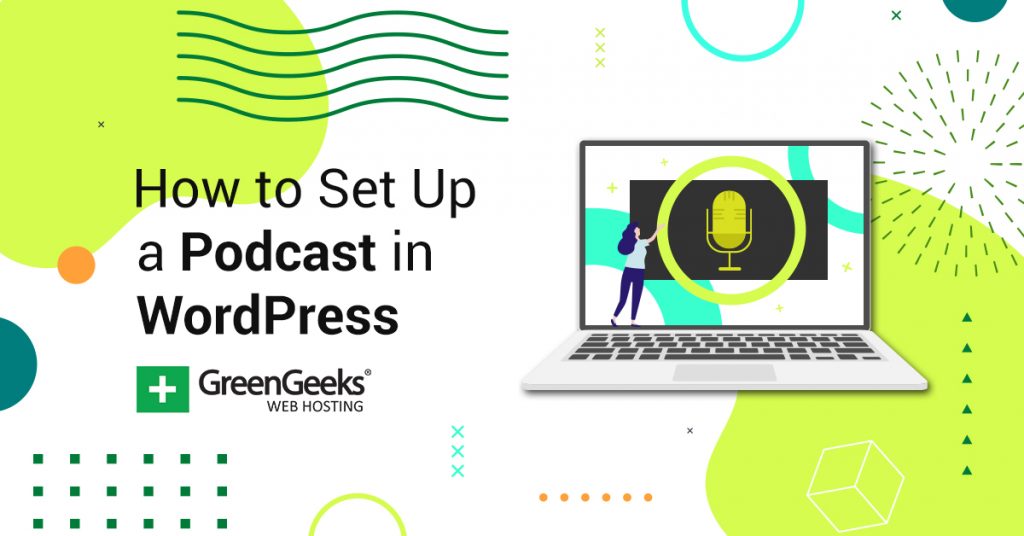Ready to start your own podcast from your WordPress website? Podcasts are a popular format, whether you’re producing an informative show or just want to entertain listeners.
They can also be used to develop a revenue stream and make money from your website. In fact, by 2021, podcasts are expected to generate over a billion dollars. As a result, there has never been a better time to start a podcast.
However, I am sure you may find creating a podcast challenging at first, but by following a few simple steps, I’m sure anyone can do it.
In this tutorial, I’m going to show you what is necessary to get your podcast integrated into WordPress.
Why Create A Podcast?
The podcast market is extremely successful and growing steadily each year. It’s a great way to create content for your core audience, expand your reach, and earn more income.
It can also be used in a variety of ways to leverage your content with visitors. For example, a common use for podcasts with content creators is to offer them exclusively to those who donate on Patreon.
Not only does this add value for those who support your channel, but it also helps justify any of the costs associated with starting a podcast. After all, you have a steady income.
Yet, podcasts can act as the center of attention for some websites or organizations. Look no further than the Joe Rogan Show. It gets over 200 million downloads each month, but not every podcast has to be huge to be successful.
In fact, it doesn’t take a large audience to make a profit if you get the right advertisers involved.
How to Start a Podcast in WordPress
Step 1: Pick A Format
Like most things, a good podcast starts with some planning. While most podcasts may seem like they are just having a conversation with another person, there’s actually a lot more planning that goes into it.
Odds are as someone interested in starting a podcast, you might have tried to actually record one yourself and probably failed or didn’t get the results you expected.
And that’s because just about everything in a podcast is planned to a certain extent.
The first thing you need to decide on is what type of format you are going to use. While there is a lot to choose from, in reality, only 4 types of podcasts are really successful.
- Interview Format: This is by far the most popular podcast style. The podcast host will bring on a guest each show and present questions to them on a specific topic they are familiar with. As a result, the guest does most of the talking.
- Conversation Format: If you have ever sat by your favorite YouTuber’s podcast, odds are this is the type of podcast they use. Typically the host and cohost have a conversation about a specific topic. It relies heavily on the chemistry of those talking.
- Solo Format: As the name implies, it’s a one-man show. While the content formula may vary, typically the host will tell a story concerning a specific subject and give their opinion, concerns, and hopes on the topic.
- Panel Format: The panel format is quite similar to the interview format, but the main difference is that there are more people. Some of the best panels include those that consist of interviewees on the opposite side. This helps you see the topic from multiple POVs.
- Scripted Format: At the beginning of the Podcast boom, many felt scripted podcasts went against the concept of a podcast. However, that has cahnges. It’s now become a common practice to ensure that the show doesn’t fall into the normal pitfalls podcasts encounter.
Step 2: Pick A Name and Make A Logo
After you have the format squared away, it’s time to pick a name.
While you can name a podcast anything you want there are some common rules you should follow. Obviously, you need to be original and make sure the name isn’t taken, it reflects your format (don’t name a solo show Rob & Freinds), and it’s a catchy name.
Another tip that can help you grow faster than normal is to include popular keywords in your title. As all website owners know, SEO is integral to getting traffic and that really isn’t any different for podcasts. However, make sure that any keywords you add sound natural.
You should also make a logo or banner to go with your name.
A podcast logo should reflect what the show kind of show it is (format) and be eye-catching. After all, there are a lot of podcasts, using a stock image is not going to cut it. In fact, that is a surefire way to end your podcast before it begins.
In most cases, the logo is what will be displayed on the video and you need it to look good.
Step 3: Gather Equipment
It’s no secret that you are going to need a few pieces of equipment to really get your podcast started. Keep in mind that you can spend a lot of money on the best equipment, but it’s not recommended when you start.
After all, there is no guarantee of success.
First and foremost is the microphone. Podcasts are meant to be listened to and not watched, as a result, you need a high-quality microphone. However, anyone familiar with audio quality will understand that it’s not just the microphone that determines it.
Instead, you need an actual room to record the audio in. You don’t want to pick up extra sounds and you don’t want your voice to bounce off the walls.
While podcasts are not overly exciting to watch, it doesn’t mean you shouldn’t record them with a quality camera. This is actually quite important for some platforms like YouTube. While you can just put a logo up for the duration of the podcast, some viewers want to see facial expressions and body language.
And with any work of media, you are going to need some editing software.
One of the most popular pieces of software is Audacity. It’s free, easy to use, and has all of the features a podcast needs. However, as you grow, the production value becomes even more important. At that point, you might want to consider using the Digital Audio Workstation (DAW) or other powerful audio editing software.
Step 4: Record An Episode
With everything else done, all that’s left is to actually record an episode. Recording an episode for the first time can be deceptively hard, but it’s certainly doable.
Make sure to have a game plan for your specific format. For example, if you are doing an interview format, write down the questions you want to ask. Make sure to do a bit of research on the guest so you can expect what they are going to say.
This can save you from an awkward silence if you know what’s coming next. If you are reading a script, practice.
Anyone who’s actually read from a script on camera before knows that it is way harder than anyone would think. Trying to find the right energy to convey what you are saying seamlessly into a show is not easy. It takes practice and a lot of it.
The same idea goes for other format structures.
In most cases, the first show is rough and its real purpose is to identify the strengths and weaknesses of the show.
Step 5: Host the Podcast
The final step is to actually host your podcast.
If you listen to podcasts regularly, you will know that all of the successful podcasts can be listened to on a variety of platforms. However, every platform is unique and you will have to go through the proper steps to make your podcast available.
For example, the most popular podcast directory in the world is Apple Podcasts (formerly known as iTunes Podcasts). To get on the platform, you need to use your Apple ID to begin the process.
Each platform is unique, and to be perfectly honest, you can expect to spend a few hours getting an account set up on a variety of programs. But, it is integral to getting your podcast to the most listeners it can reach.
Integrating the Podcast With WordPress
The next thing you’ll need is to integrate WordPress with your podcast hosting. That will give you the ability to market the podcast while offering your visitors something more from your site. Even if your shows are served by a podcast host, you can still play them from pages and posts you create.
Using WordPress Podcast Plugins
There are several ways you can distribute a podcast. For instance, listeners may be able to search Apple Podcasts for your content. However, you can make your website work for you, even more, using a WordPress podcasts plugin.
There are a variety of plugins that will help you connect with multiple podcast hosting services. This can help turn your website into the control panel for all of your podcasting management. However, you still first need to sign up on each platform individually.
Here are some of the most helpful plugins to consider:
PowerPress Podcasting
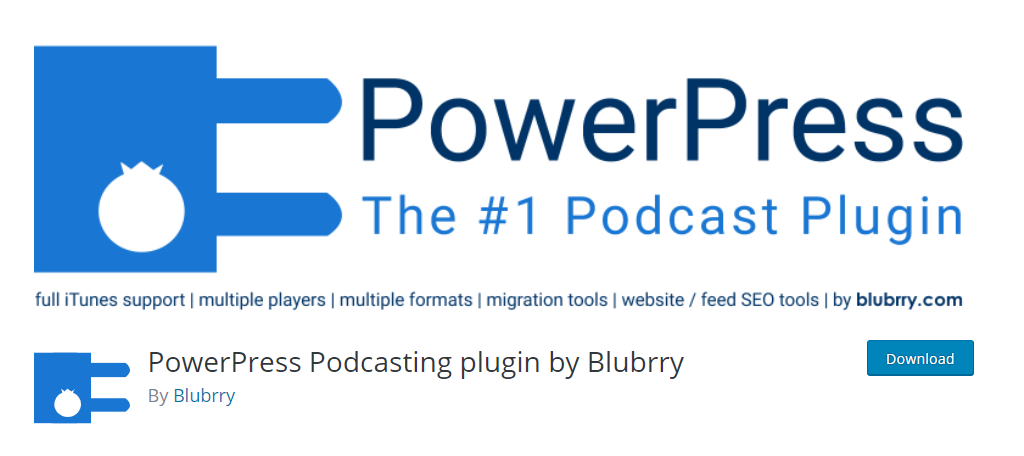
One of the best plugins I can recommend is the Blubrry PowerPress Podcasting plugin. It connects your site directly to various systems such as Apple Podcasts and Google Play while also providing a system for marketing on your website.
It can also help make posting podcasts on your website a breeze.
Seriously Simple Podcasting
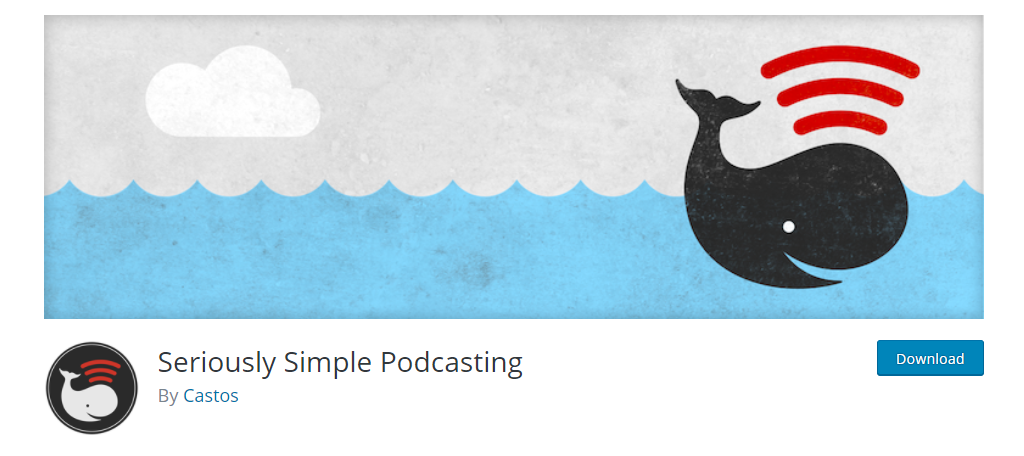
The Seriously Simple Podcasting plugin is a great addition to any website that wants to add podcasts in WordPress. With it, you can fully integrate your website with Castos Podcast hosting services. And you can manage multiple podcasts with unique settings.
The main advantage of this plugin is its analytical functionality. With it, you can track the number of listeners, see how listeners are finding your show, and a plethora of other useful stats. You’re going to need an analytical tool, and this is one of the best.
Podcat Subscribe Buttons
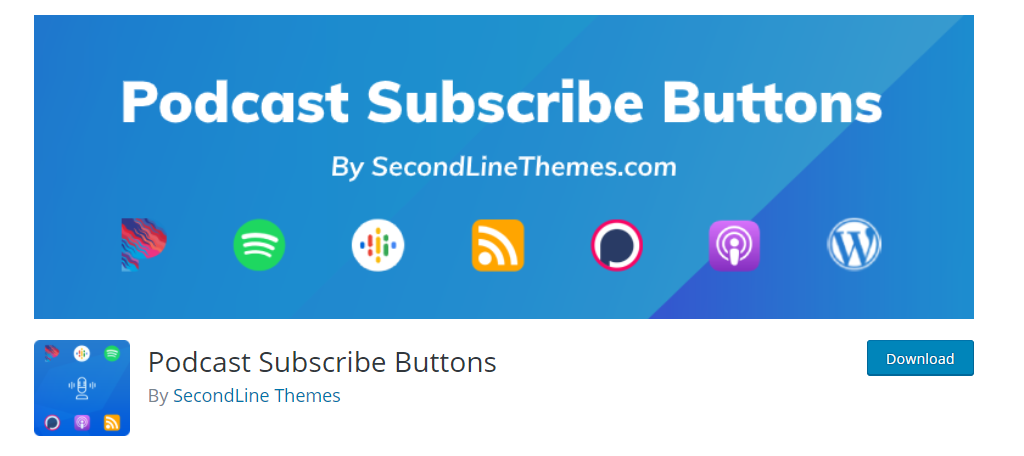
Getting new listeners is never easy and keeping them might be even harder. With the Podcast Subscribe Buttons, you can improve your odds by making it easy for listeners to subscribe with subscribe buttons from the biggest platforms.
That way they can get updates whenever new podcasts are released.
Best WordPress Podcast Themes
The other major part of building any kind of WordPress website is picking the right theme. While you can add podcasts to any theme in WordPress, some just do a better job than others.
Obviously, if a podcast is just an addition to your other content, you probably don’t want to pick a theme that focuses on a minor component of your website. Thus, not everyone is going to need a new theme, but for those that do, we have you covered.
Here are some of the best theme’s to consider when running a podcast website:
Podcast

As you might have guessed from the name, Podcast was built for podcasts. It allows you to embed podcasts from just about anywhere including Spotify, SoundCloud, Libsyn, Youtube, Apple Podcasts, Google Podcasts, Simplecast, Castos, Anchor.fm, and many more.
Simple Podcast
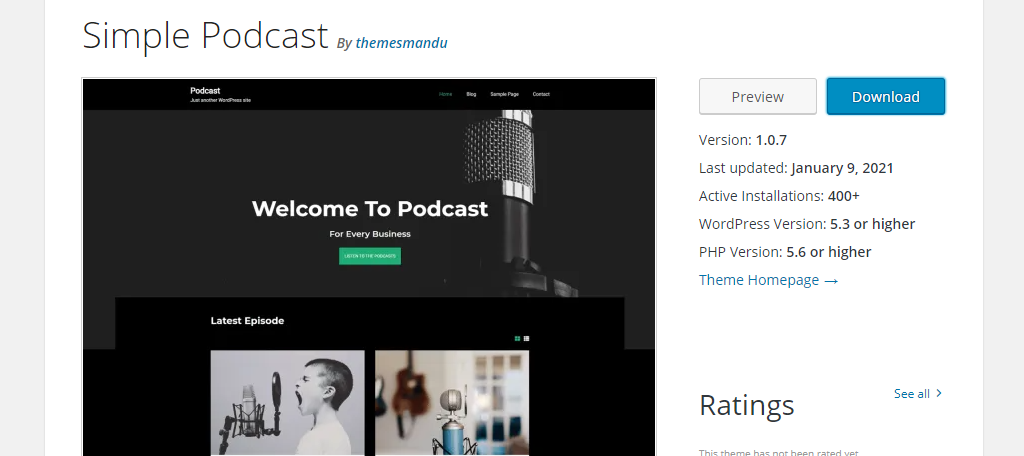
Simple Podcast posts a more modern design and was also built for podcasts and video content. The theme was built with mobile users in mind, thus it is fully responsive. It also has a great appearance for blog content.
Podcast SecondLine
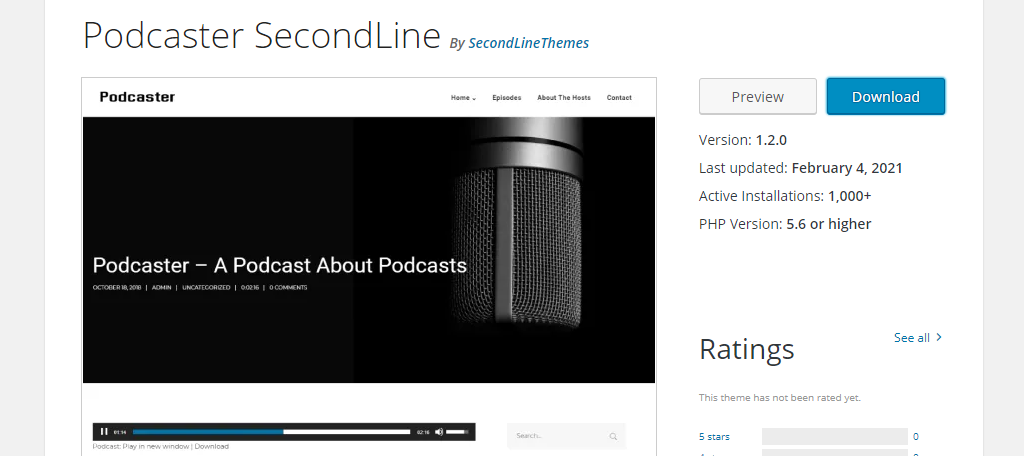
Another great option to consider is Podcast SecondLine. This theme was built for podcasts and is very lightweight to ensure that large media files do not slow down your website. That said, it really is only good for podcasts, thus, if you plan on having other content, look elsewhere.
Marketing Your Podcast
Growing your podcast is going to be a challenge, just like growing your website, social media presence, or anything else on the internet. You will need to market your podcast to the world.
A few ideas for you to consider include:
- Link to your podcast on social media platforms like Facebook and Twitter
- Make sure your podcast is available on every major podcast platform
- Add blog content to your site to improve your website’s SEO
- Create an email subscription to let visitors know when new podcasts are released
- Try to appear on other podcasts to advertise your own platform
In reality, there are a ton of ways to promote your podcast on the internet. But the biggest thing to keep in mind is patience. It could take months to even get a handful of dedicated listeners, thus you need to be prepared for an uphill battle.
How to Make Money With Podcasts
Podcasts have multiple revenue-generating opportunities, just like websites, and figuring out which ones work best for you is critical for success. Here are some of the most popular ways to make money with a podcast.
Advertisments/Sponsors
I guarantee that if you listen to Podcasts, the host has taken a moment, or several, to highlight the sponsor of the show. While it might sound annoying as a listener, it is how the podcaster gets paid, and it can get pretty lucrative if you have a big audience.
This is so common that there are multiple networks dedicated to connecting advertisers with podcasters, like Midroll. Even podcast hosts have their own networks you can utilize, but there is a catch. You typically need a large audience, usually over 5,000 listeners.
And that isn’t easy to acquire. However, once you get enough listeners, this is hands down the best way to advertise your podcast.
Patreon (Crowdfunding)
A lot of podcasts are supported with Patreon and other crowdfunding solutions. Or to put it another way, the listeners pay you to create the show. However, unless you already have a following that is begging you to start a podcast, it can be challenging to get started.
Once you begin, you can try to release your Podcast to supporters first to help incentivize listeners to support the show. Just keep in mind, if your show isn’t great, getting supporters is even harder than getting listeners.
And in many cases, you might outgrow crowdfunding if you find success with other monetization options.
Affiliate Marketing
Just like on a regular website, affiliate marketing is one of the best ways to earn money with a podcast. Talk about the product, explain how useful it is, and hope listeners decide to buy it. If they do, you get a commission.
The main issue with this when it comes to podcasts is that listeners typically listen to this on another tab or in the background while doing other activities. This can make it difficult for them to find the affiliate link in a description or on screen.
However, there is definitely room to make money.
Combine It With A Service
This option isn’t available to everyone, but if you run a business, adding your podcast as part of the service could help entice sales. Now, I know some of you may be rolling your eyes at this, but it’s actually not that strange.
For example, let’s say you run an SEO team that helps customers improve their SEO. Creating a podcast that talks about SEO and even invites guests that are experts in SEO is a pretty great idea. This provides additional information to customers and it can be entertaining.
That said, if the podcast isn’t great the user might get the wrong idea about your services, so it can be a blessing and a curse.
Sell Merchandise
Selling merchandise is a great way for a website, YouTube channel, or even a podcast to make money. Let’s face it, you can pretty much stick anything on a t-shirt and people will buy it. Consider adding your logo to t-shirts, hats, coffee mugs, and more.
The more popular you get the more you will sell. Many have found success utilizing FOMO sales tactics. For example, you could sell a coffee mug that will only be available for one season of your podcast before it’s gone forever.
This gives you an excuse to create a new design and sell it to loyal listeners.
Do I Need A Web Host & Podcast Host?
If you choose to build a dedicated website for your podcast, which you should, you may think it is redundant to also pay for a podcast host. However, it is one f the best decisions you can make.
Though, you could also use free services for hosting podcast audio files, such as Anchor.
Directly hosting any form of video or audio content on a website uses a lot of resources. This is why most websites will use YouTube to host their video content. Those resources not only cost you money but will affect website performance.
And since you will be creating new content on a weekly or even daily basis, you are going to need more resources every year. That get’s expensive.
Podcast hosts specialize in hosting your podcast, and you can then embed it onto your website using a plugin. This will use just a fraction of the resources which means your website will load faster.
And since load times are a factor in web rankings, it also means your content will reach more people.
Get More Visitor Engagement with a Podcast and WordPress
Setting up a podcast in WordPress opens the doors to a whole new world of possibilities for your website. That lets you expand beyond text content and engage the audience in a whole new way. If you produce a weekly show to accompany your site, it has the potential to make a big difference in traffic and brand recognition.
It can also help you increase your website’s revenue. If your podcast can reach a large enough audience, you will find that advertisers really like the podcast format. And that translates into money for you.
While creating a podcast is a lot of work, it is a great addition to any website.
Do you have plans to set up a podcast from your website? What kind of show would you produce if it meant gathering thousands of fans?

